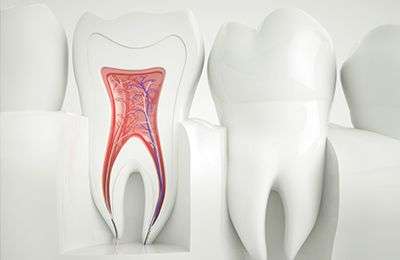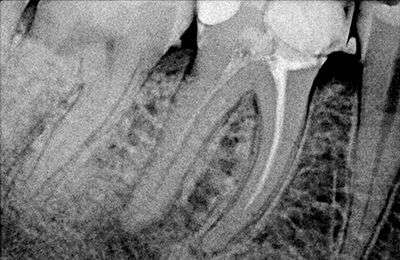How Long Does A Root Canal Last?

In the center of every tooth lies a chamber. Inside this space, there is a nerve, an artery, and a vein. This living tissue is called the pulp of the tooth. If decay, trauma, cracks, or fractures violate the sanctity of the pulp chamber the living tissue will start to die (necrose). As the organic tissue starts to break down first we see inflammation and then we see the infection. As a patient, you will feel a dull ache at first. Then the pain becomes more severe, pounding at times. The pain increases when we lie down if we eat something hard or hot. There can be a bump in our gum or even swelling in our face. This is the classic toothache with subsequent dental abscess formation. So what are we to do? There are two options. Extract the tooth or perform root canal therapy.
The Root Canal Procedure
- Local anesthesia is given at the infected tooth and a rubber dam is placed to isolate the tooth.
- A small opening is made into the tooth.
- The endodontist (a dentist specializing in root canal therapy) will use tiny instruments to remove the infected tissue in the chamber and canals of the tooth.
- The chamber is sterilized and filled with an inert material (gutta percha) so that re-infection will not occur.
- The tooth will in most cases be restored with a core and beautiful porcelain crown.
How Long Does it Last?: Root Canal Success Rates
487,476 root canal treatments were part of the following study:
Success rates:
- 98% after one year
- 92% after five years
- 86% after ten years
- Molar root canal therapies were significantly more successful when performed by an endodontic specialist than a general dentist.
Factors that Affect Success
- Prompt treatment at first signs of a toothache to stop the infection from spreading.
- Quality treatment by an endodontist (root canal specialist) to ensure that all canals are filled and that there is no contamination of saliva.
- Proper core and crown placement to restore the tooth to form and function
- Tooth location: Front teeth are easier to operate on as there is only one canal and they are not subjected to the occlusal forces that the back teeth must absorb.
- Age of patient: As one grows older, teeth become more brittle and can fracture more easily after treatment. Canals may be more calcified and more difficult to prepare.
- Other factors:
-
- Habits such as grinding teeth (bruxism) and clenching
- Trauma from sports, falling and other accidents
- Systemic diseases such as diabetes
- Radiation
- Medications
Options If Root Canal Therapy Should Fail
- Retreatment of the root canal (same as an original procedure, except now removing gutta-percha rather than pulp tissue).
- Apicoectomy: This is a small surgical procedure at the apex of roots.
- Extraction of the tooth
Root Canal at Midtown Endodontist NYC
At Midtown Endodontist NYC, Dr. Steven Lipner specializes in root canal therapy. Dr. Lipner is one of the most acclaimed endodontists in New York City. Dr. Lipner uses cutting-edge technology in his treatment. He uses a microscope to ensure the most conservative and precise results. With his reassuring, informative, and gentle manner patients rave at the wonderful experience. If you have dental discomfort, swelling, or throbbing pain Dr. Lipner is ready to alleviate your symptoms and restore your smile.
 Our Providers
Our Providers
 Blog
Blog
 Contact us
Contact us
 Endodontics
Endodontics
 Root Canal Treatment
Root Canal Treatment
 Emergency Root Canal
Emergency Root Canal
 Root Canal Retreatment
Root Canal Retreatment
 Complimentary Teeth Whitening
Complimentary Teeth Whitening
 Teeth Whitening
Teeth Whitening




